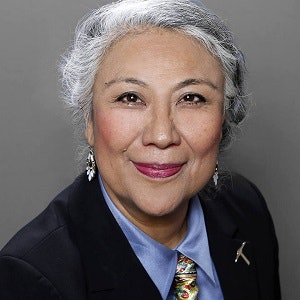After Black Lives Matter protests this summer and yet another police shooting of a Black man – Jacob Blake in Kenosha, Wisconsin on Sunday – college students want to talk about racism. And faculty across disciplines are trying to figure out how to facilitate those conversations in their real and virtual classrooms.
A new guide on anti-racist pedagogy could help. Released on Tuesday by Packback, an online discussion platform, the guide compiles strategies for educators to foster meaningful, reflective discussions about race with their students, based on interviews with three scholars.
 Dr. Selfa Chew
Dr. Selfa ChewDr. Akil Houston, one of the participants, praised the guide as more than a “performative act of racial solidarity” but a sincere exploration of the question, “What can we do that will have long-term implications?”
An associate professor of cultural and media studies in African American studies at Ohio University, Houston hopes the handbook will encourage faculty to get “comfortable with being uncomfortable,” he said, especially scholars in fields that might see conversations about racism as beyond their purview.
“I think the times call for us to say, ‘Let’s put some boots on the ground and engage from where we are, as we continue to learn, as we develop the tools and strategies to have these conversations in our classrooms,” he said.
The guide stresses to scholars that, while they don’t need to be experts, they should come to these discussions prepared. That means setting clear communication guidelines and discussion intentions for students, planning reflective writing assignments that help students engage with their own ideas before class, thinking through how to respond to possible scenarios that might come up – like a student using an anachronistic or offensive term – as well as readying themselves to model vulnerability by sharing personal stories when relevant.
For example, interviewee Dr. Selfa Chew, an associate professor of instruction at University of Texas at El Paso, openly discusses her own experience as a minoritized scholar and what it means to be a non-Black professor teaching African American studies.
 Dr. Alisa Cooper
Dr. Alisa Cooper“My students know that it’s ok to share personal experience and to make sense of it through knowledge, through information, through analysis of the context,” Chew said. “Racism is real, and if we don’t acknowledge this reality, then the class becomes too abstract for them.”
The guide also highlights the transformative potential of discussions between students in a diverse classroom. By facilitating guided conversations about race, without taking too “directorial” of an approach, students can learn from each other, noted Dr. Alisa Cooper, a professor of English at Glendale Community College and Maricopa Community College.
When Cooper participated in the making of the guide, the “key thing” she wanted colleagues to take away is that “a lot of students show up in our college classrooms and they will never have an opportunity in some cases to learn about different cultures and the way that different people feel about certain things,” she said. “And this is an opportunity that we have as a faculty to be able to give students a voice to be able to express themselves … and be heard and have others be able to learn about those experiences. If we don’t give that opportunity in our classrooms, they may never get that opportunity anywhere.”
To enable that kind of sharing, she wants to see faculty not just assign readings from minority authors but guide students in thinking about why – even if it’s simply by asking an open question like how writers’ perspectives differ from one another and why that might be. Switching it up from “old White guys” is just a first step.
 Dr. Akil Houston
Dr. Akil HoustonAnd for Chew, it’s important to remember that a course’s reading list isn’t fixed. If specific questions come up in class discussions, she tries to tailor her lessons accordingly, bringing in new voices and topics.
In conversations about race, sometimes there are areas “that beg for more reflection and also more information,” she said. “I can scaffold, I can retool and adjust to their needs.”
Houston also tries to maintain that flexibility in his classroom and advocates that faculty pay attention to who their students are each semester, because groups have “different personalities.” Sometimes, he finds himself with a class that’s already engaged in discussions about racism. Other times, students are taking his class to knock out a requirement with little interest or prior engagement, and he needs to find “entry points” for them, which takes a separate approach.
Ultimately, he hopes faculty using the anti-racist pedagogy guide’s strategies will make the guide itself obsolete.
The goal is, a decade from now, “when people think about the guide, they’ll say, ‘Oh, it’s irrelevant. It’s outdated,’ because we’ve moved as a society and as scholars …” Houston said. Reflecting on the latest shooting, “it doesn’t look like that’s going to be the case, but ultimately I do hope we collectively do our jobs well enough that we’re not having these conversations five, ten years down the road, that we’ve actually moved forward and we’ve progressed beyond this moment.”
Sara Weissman can be reached at sweissman@diverseeducation.com.















